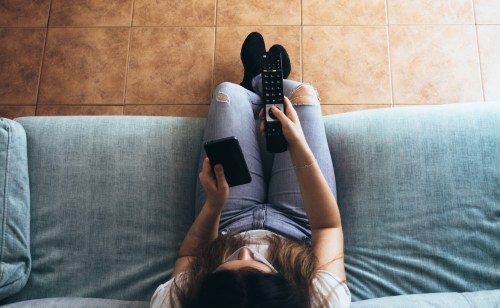‘Switching Off Digital Autopilot Is the Only Thing That Helps Me Keep My Chronic Fatigue Under Control’
For me, coping with chronic fatigue came down to switching off my digital autopilot and becoming for conscious of my screen time.

After years of going to the doctors and being told my lethargy and brain fog were a consequence of my “student lifestyle,” I finally received a long-awaited diagnosis of chronic fatigue syndrome (CFS), which is the common name for myalgic encephalomyelitis (ME), an under researched and underdiagnosed condition that affects approximately 2.8 million Americans—the majority of whom are women. Coping with chronic fatigue is challenging because Currently, there is no cures or treatment protocol for ME/CFS, according to the Centers for Disease Control (CDC). But those diagnosed with the condition can manage their symptoms are encouraged to manage their symptoms with self-care, therapy, and medication such as anti-depressants, per the Mayo Clinic.
Experts in This Article
Sue Peacock has a PhD in pain psychology and is registered with the Health and Care Professions Council.
Following my diagnosis, doctors offered advice that focused mainly on improving my quality of sleep, diet, and exercise habits—all of which I had previously tried to no avail. I had come to accept that I was destined to a life of torpidity at the hands of my “incurable” chronic fatigue. For the most part, I managed to crack on with day-to-day life, tolerating my symptoms to the best of my ability. But then the pandemic struck, and life became a lot more difficult.
Confined to the four walls of my house, I started experiencing a heightened form of cabin fever and, with each passing day, my energy levels were depleting to an intolerable level. The worst part? I felt like there was absolutely nothing I could do about it. I knew that the doctors would only offer me the same advice they’d already given me: Go for a walk, drink lots of water, avoid caffeine, take your vitamins, and make sure you’re eating the right food.
Not only were my chronic fatigue symptoms worsening, but I was beginning to experience a debilitating anxiety which, paired with my lethargy, prevented me from getting out of bed. As I had resigned myself to never finding a cure to my chronic fatigue, I focused on looking for techniques for coping with anxiety instead.
The common theme I was finding in my research was that increased social media consumption was heightening anxiety during the pandemic. Off the back of this, I decided to undertake a social media fast. Whilst this certainly decreased my anxiety, I found that my fatigue continued to worsen, and I knew there must be a reason for this.
After analysing my lifestyle, I realised that my general media consumption had increased since cutting out social media. I had replaced my mindless social media scrolling with binge-watching Netflix series and listening to hours and hours of audiobooks.
With the suspicion that my increased media consumption was the culprit behind my increasing fatigue, I decided to abandon all forms of digital media that could only be consumed on autopilot, including audiobooks, TV shows, movies, documentaries, and, of course, social media. For me, this was a form of fighting back at the mental drain that is often accompanied by the consumption of online entertainment.
Instead, I became selective with what I was reading, watching, and listening to every day, and I found that actively participating in media was, in fact, reducing my fatigue. I found that rather than passively receiving information on autopilot, my brain was now constantly alert and challenging the little media that I was consuming, in addition to anything I was reading. As a result of this, I was no longer experiencing the brain fog and lethargy I had become accustomed to due to chronic fatigue. After years of being told by the doctors that there is no cure to my chronic fatigue, I had finally found one in this digital detox.
Curious to understand this connection further, I spoke with Sue Peacock, consultant health psychologist at A Pain in the Mind, who says that her CFS clients “often don’t realise that using social media uses mental energy” and, in response, she “discuss[es] energy conservation and activity management plans” with them. Having said that, Dr. Peacock explains that this varies from client to client as, for many people, these forms of media serve as a medium of relaxation, which is an important process in easing symptoms of chronic fatigue.
Current medical advice for chronic fatigue is often outdated and under researched. In that same way that Doctors advise CFS/ME patients to be intentional and selective with the foods they consume and the physical activities they partake in, the same should be said for digital consumption. The forms of media which are only watched, listened to, or read on autopilot are often those which are, unknowingly, draining us the most.
Switching off digital autopilot reduced my chronic fatigue symptoms to the point where I didn’t notice them at all anymore, and I believe others who suffer from CFS/ME would benefit by doctors adding it to the lifestyle changes the suggest people make to manage their symptoms, which feel outdated to me in the current, overwhelmingly online world we live in right now.
Oh hi! You look like someone who loves free workouts, discounts for cutting-edge wellness brands, and exclusive Well+Good content. Sign up for Well+, our online community of wellness insiders, and unlock your rewards instantly.
Sign Up for Our Daily Newsletter
Get all the latest in wellness, trends, food, fitness, beauty, and more delivered right to your inbox.
Got it, you've been added to our email list.










